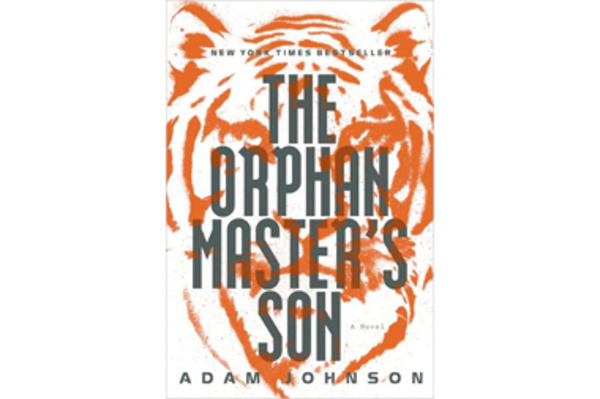Orphan Master's Son

The novel begins and ends with the omnipresent Loudspeaker that continually assaults North Koreans in their homes with surreal statist news and tall tales. The “starving” Americans are “pirates” perpetually poised to launch a sneak attack; America is a degenerate nation rife with, among myriad other horrors, “illiteracy, canines, and multicolored condoms.” North Korea, of course, represents the pinnacle of human progress, where the odd famine is merely an “Arduous March.”
Despite its dark mission, the Loudspeaker inadvertently dispenses meaningful information on occasion, as when it cautions citizen to keep snares set for pigeons out of the reach of young comrades. Needless to say, this national pastime is not “catch and release.” Other staples of the North Korean diet, particularly in the prison mines, include a high protein oxen repast that leaves the source alive, well, and lowing. Extreme North Korean fare is not for the squeamish.
It is against the Loudspeaker and its relentless stories that Pak Jun Do and his fellow travelers struggle to find their own voices. Establishing one’s own identity, making personal choices, or nurturing a nascent conscience are risky business, and inherently subversive. They can get you killed, or worse. When things go from bad to worse in North Korea, life can lose the last shred of appeal. Many characters in the book have a prized can of fruit handy, infused with botulism, for themselves and their families. At least they get to decide when and how they die.
Despite its grim subject matter, The Orphan Master’s Son, Adam Johnson’s second novel, is a wonderfully written and gripping, rich in symbolism, and replete with quirky characters, from the Dear One (leader Kim Jong-il, who died last year) to the latest apple of his eye, a naked American nighttime rower. Johnson, who teaches creative writing at Stanford University, will be turning away students next semester. His latest creation is worthy of being mentioned in the same sentence with “Darkness at Noon” and “1984.” It is a reminder of our potential for depravity, our capacity for deliberate, institutional evil.
On the slightly less gloomy side, North Korea is not succeeding, either materially or ideologically. Many of Johnson’s characters remain human at their core. They commit random acts of subversion, aimed not at regime change but at reaffirmation of their inherent humanity. When a seaman defects in a life raft, the rest of the crew concocts a “heroic” yarn that will save his family and themselves from collective punishment. Jun Do submits to a shark bite to make the tale plausible. The system encourages such conspiracies.
Nor can the Loudspeaker completely shape reality. North Koreans know about Disney World. They also realize that Kim Jong-il probably didn’t actually shoot 38 under par – with 11 holes-in-one – in his very first round of golf. This bizarre news flash is recounted in the novel but it is not fiction; and the Dear One probably didn’t believe the report would be believed either. He was showing off, messing with his flock, daring them to make the almost irresistible jokes and risk oblivion. Satire is not a good career move in North Korea, unless you are the Dear One.
Jun Do knows that there is an alternate reality out there. He is a tunnel fighter who has traveled to South Korea surreptitiously, beneath the Demilitarized Zone. From other soldiers who have scouted enemy territory he learns about the machines that hand out money, the giant TVs, and the well-fed city people who follow dogs around, not to kill them for food but to clean up after them. The Loudspeaker has always insisted that South Korea is plagued by widespread poverty and famine.
Jun Do chooses not to see these southern wonders with his own eyes, or defect, because he knows this would make a lie out of everything he has done in the name of his country. He is not a cut-and-run kind of guy, but he has his limits. In his next assignment, as part of a kidnapping squad, he can see clearly from the bright lights of Japan at night that there has been no Arduous March there. He also knows that what he is doing is wrong, and if and when he gets an opportunity he will try to make amends.
Besides translating the political anathema that is North Korea into the personal realm, Johnson has penned a ripping good thriller, full of surprises and derring-do, blood and guts, cowardice and heroics. If the action is not always entirely plausible, all is forgiven. The reader wouldn’t have it any other way; and heck, North Korea is so strange, so remote from our experience, who knows what might be possible there. It should be noted that the author has been there and clearly has done his research.
What’s to become of such a place? The woman who helps Jun Do survive in the prison mines knows: “[I]t cannot last. One day all the guards will run away, they’ll head that way, for the border. There will be disbelief, then confusion, then chaos, and finally a vacuum. You must have a plan ready. Act before the vacuum is filled.”